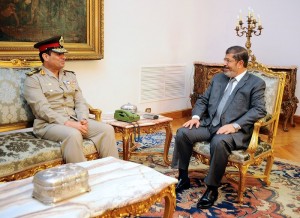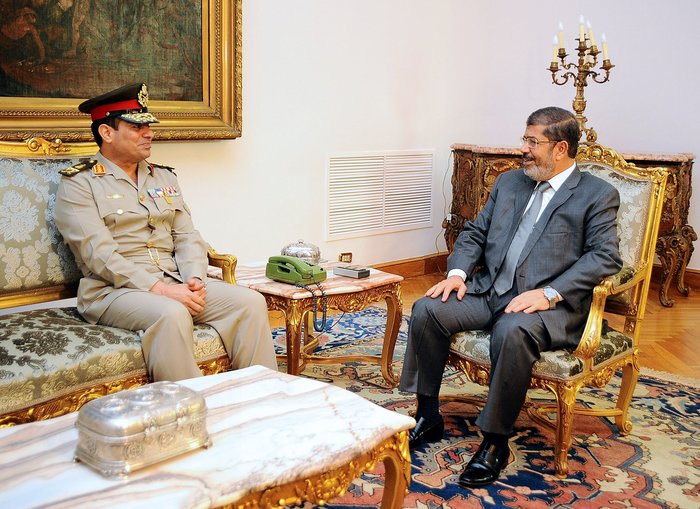
AFP PHOTO/HO/EGYPTIAN PRESIDENCY
General Abd Al-Fatah Al-Sisi, newly-appointed Minister of Defence and Commander-in-Chief of the Armed Forces, confirmed on Monday the composition of the revised Supreme Council of the Armed Forces. The future role of the council still remains unclear.
Monday’s announcement solidifies the status of members of a body which, until the arrival of President Mohamed Morsy in June, held the highest level of power in Egyptian politics.
Amid speculation about the future powers of the president, it was announced Morsy will not be taking up the post previously occupied by the Mubarak-era general, Field Marshal Tantawi, leaving this post to Al-Sisi. Morsy will, however, retain overall command of the military, in the form of Supreme Commander of the Armed Forces.
Chief of Staff of the Armed Lieutenant General, Sedki Sobhi, will be Deputy Chairman.
The council will be composed of 18 of Egypt’s top military leaders:
Commanders of the military’s main service branches:
- Air Vice-Marshal Younes Hamed, Commander of the Air Force
- Rear Admiral Osama Al-Gendy, Commander of the Navy
- Major General Abd Al-Moniem Al-Terras, Commander of the Air Defence Forces
The commanders of Egypt’s field armies:
- Major General Ahmed Wasfy, Commander of the Second Field Army based in Ismailia
- Major General Osama Askar, Commander of the Third Field Army based in Suez
The commanders of the main military zones:
- Central Military Zone, Major General Tawhid Tawfiq
- Northern Military Zone, Major General Gamal Shehata
- Southern Military Zone, Major General Mohamed Arafat
- Western Military Zone, Major General Mohamed Al-Masry
The remaining members of the will council consist of:
- Chief of Operations of the Armed Forces, Major General Nabil Al-Shazly
- Chief of the Engineering Authority of the Armed Forces, Major General Taher Abdullah
- Commander of the Border Guards Force, Major General Ahmed Ibrahim
- Director of the Morale Affairs Department, Major General Ahmed Abou Al-Dahab
Two of Field Marshal Hussein Tantawi’s former assistants have remained in their positions and will also have seats on the SCAF:
- Assistant Minister of Defence for Constitutional and Legal Affairs, Major General Mamdouh Shahin, who represents the military in the Constituent Assembly.
- Assistant Minister of Defence for Armament Affairs, Major General Mohamed Al-Assar
Al-Sisi has yet having yet to pick his own replacement as Director of Military Intelligence and Reconnaissance.
Al-Sisi also announced new appointments to government posts outside of the council. There will be a new Chief of Military Justice, Major General Medhat Ghezy, and a new Director of Military Police, Major General Ibrahim Al-Domiaty.
The formation of the new council comes two days after Al-Sisi sent about 70 generals from the military into retirement. Although suspected to be a move by the president to assert his authority over the military, the decision is now being described as due to nothing more than the expiration of the generals’ terms in the military.
The 70 dismissed generals included high ranking military leaders who were part of SCAF under Tantawi’s leadership, such as; Mamdouh Abd Al-Haq, Ismail Etman, Mohsen Al-Fangary, AdAl Omara, Samy Diab and Mokhtar Al-Mula.
SCAF has undergone a massive reshuffle following President Morsy’s decree on 12 August to send several high-ranking military leaders, including Tantawi and his Chief of Staff, Lieutenant General Sami Anan, to retirement. Shortly afterwards Al-Sisi was appointed as the new Minister of Defence and Military Production.
It is unclear what role SCAF will play in the Egyptian political scene from now on, with reports coming out of the Constituent Assembly indicating that the next constitution will give the president complete power over the military.
These reports suggest that the president will no longer be obliged to ask for the military leadership’s advice before declaring war and will not need its approval.
SCAF as an entity is not mentioned in the articles drafted by the Constituent Assembly’s System of Governance Committee. The draft constitutional articles refer instead to a National Defence Council, which will be made up of an equal number of civilian and military officials, and chaired by the president.




